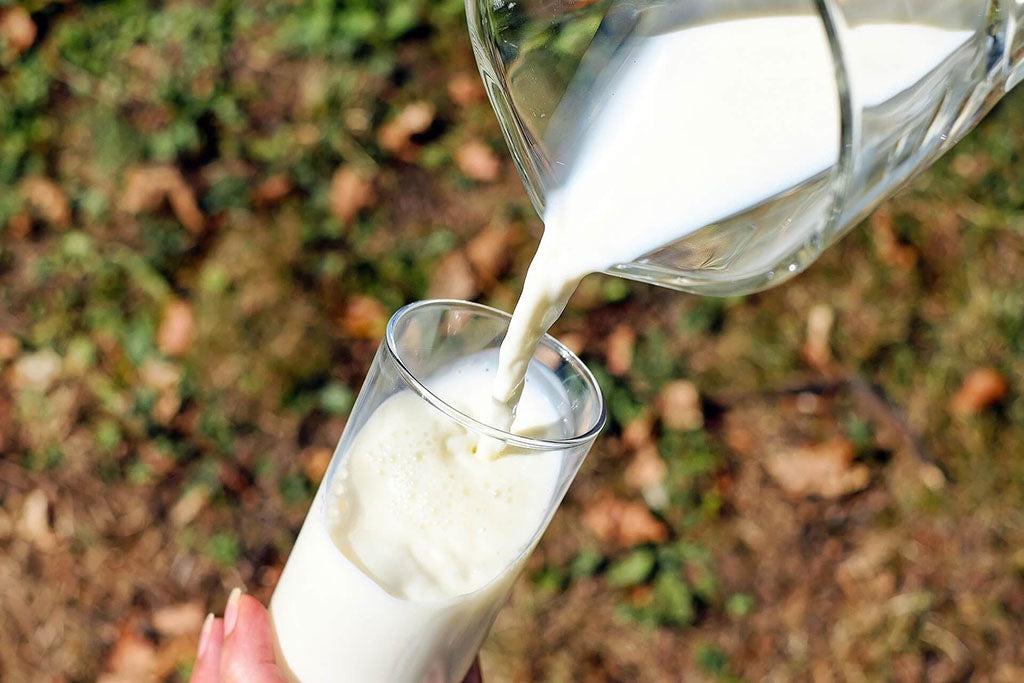In this blog, we learn whether milk is good or bad for dogs. From goat’s milk to cow’s milk, soy to oat, almond to coconut, we’ll learn whether a dog can have milk and if there are any benefits or risks to introducing milk to your dog…
Is Milk Good For Dogs?

Many dogs love a little taste of cheese and other dairy products. But, when it comes to milk should we be encouraging them to continue enjoying the taste or redirect them elsewhere? Is milk good for dogs?
Can Dogs Have Milk?
Did you know that many dogs are actually lactose intolerant? Lactose is the natural sugar that’s present in milk. So, your dog may have trouble drinking milk but might be able to have tiny amounts of cheese (not blue or moldy cheese though!) and plain yogurt which is usually easier to digest because they are typically lower in lactose than milk.
However, in small quantities, milk (both goat’s and cow’s milk) can be given to a dog but no more than a few tablespoons worth. Excessive amounts of milk can cause stomach pain, diarrhea, loose stools, and in some cases vomiting, so milk should definitely be served as an occasional treat.
Symptoms of lactose intolerance in dogs (as well as sickness, stomach pain, and diarrhea) also include swelling or tenderness of the abdomen, dehydration, abrupt weight loss, itching/inflamed skin, excessive thirst, flatulence, and lethargy/weakness.
>Milk is high in fat and lactose (natural sugar) and too much of both of these things can cause pancreatitis in dogs and contribute to obesity. Being overweight can cause multiple health issues in a dog.
In addition, it’s also worth noting that if you ever find yourself in the position where you’re in charge of the care of a pre-weaned puppy that requires bottle feeding, make sure to use specialized milk designed for puppies. Lactose concentrations in a nursing mama dog’s milk is about 3%, and cow’s milk contains 5% so this can prove to be far too much stress on a puppy’s tummy.

Can Dogs Have Almond Milk?
Almond nuts aren’t toxic to dogs, but canines, in general, don’t digest them with much ease. They’re also incredibly high in fat which, as discussed above, can be detrimental to a dog’s health. However, as long as the almond milk doesn’t contain xylitol (artificial sweetener), like cow’s and goat’s milk, a dog should be able to enjoy a few tablespoons of almond milk as an occasional treat.
Can Dogs Have Oat Milk?
Oats are not toxic to dogs, but may prove difficult for a dog to digest in large quantities. A few tablespoons worth served as a treat should be fine for your pooch on occasion.
Can Dogs Drink Coconut Milk?
Coconut milk in controlled amounts should be OK for a dog to drink, but as with cow’s milk, an excessive amount may cause things like diarrhea. Make sure to read the ingredient label to check for additives in your coconut milk that may be toxic to dogs, like xylitol (artificial sweetener).
Coconut is actually touted to have multiple benefits for a dog, too!

Can Dogs Have Soy Milk?
Soy milk, in even moderate quantities, is not thought to be toxic to dogs and relatively easy for a dog’s body to digest. So, yes, dogs can have soy milk.
Is Breast Milk OK For Dogs?
No, you should not allow your dog to drink human breast milk. Yes, breast milk is packed with nutrients designed to benefit a human baby, but will most likely cause an adverse reaction in your dog if they get hold of some. The lactose levels in breast milk are too high, so your pup will probably throw up, experience diarrhea, a general upset stomach and it may cause them to feel unwell. If your dog has drunk human breast milk, their sickness doesn’t seem to be subsiding and they seem distressed, take them to the vet.
If you’re wondering what other foods and beverages you shouldn’t give to your dog, check out our PetLab Co. guide below which lists all items that are known to be toxic to dogs so you know which foods to avoid allowing your dog to eat:

Sources
https://www.akc.org/expert-advice/nutrition/can-dogs-drink-milk
 S
S



